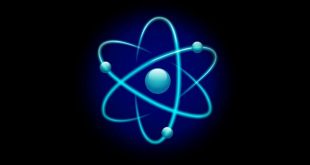Question: Name the three processes in which oxygen is used. Answer: Combustion, respiration and in the formation of oxides of nitrogen. Question: Name two natural resources available on the earth. Answer: Water and air. Question: Give one example of biotic component of the biosphere. Answer: All animals, plants and micro …
Read More »9th Class (CBSE) Science: Structure of the Atom Quiz
NCERT 9th Class (CBSE) Science: Structure of the Atom Quiz 17 Multiple Choice Questions related to NCERT 9th Class (CBSE) Science: Structure of the Atom Quiz Canal rays are positively charged radiations which led to the discovery of positively charged sub-atomic particle called proton. As per Rutherford’s model of an …
Read More »9th Class (CBSE) Science: Structure of the Atom
Question: What is an election? State its relative mass and charge. Answer: The negatively charged particle found in the atoms of all elements is known as electron. The relative mass of an election is 1/1840 u & charge is – 1 (minus one). Question: What is the absolute mass & …
Read More »NCERT 9th Class (CBSE) Science: Sound Quiz
NCERT 9th Class (CBSE) Science: Sound Quiz 23 Multiple Choice Questions related to NCERT 9th Class (CBSE) Science: Sound Quiz The way our brain interprets the frequency of an emitted sound is called the pitch. The quality or timber of sound helps us to distinguish one sound from another having …
Read More »NCERT 9th Class (CBSE) Science: Energy and Work Quiz
NCERT 9th Class (CBSE) Science: Energy and Work Quiz 19 Multiple Choice Questions related to NCERT 9th Class (CBSE) Science: Energy and Work Quiz It states that energy can neither be created nor destroyed. It can only change its form. The winning team does work. The work is equal to …
Read More »NCERT 9th Class (CBSE) Science: Sound
Sound – 9th Class NCERT CBSE Science Chapter 12 Question: Can sound travel through: Carbon Water Answer: yes yes Question: Can sound travel through vacuum? Answer: No, sound cannot travel through vacuum. Question: Name the type of waves which are used by astronauts to communicate with one another on moon (or in …
Read More »9th Class (CBSE) Science: Atoms and Molecules
Question: Define law of conservation of mass. Answer: In a chemical reaction mass can neither be created nor destroyed. E.g., 2Na + Cl2 —–> 2NaCl 2 x 23 + 2 x 35.5 ——> 2(23 + 35.5) Question: Explain law of constant proportion. Answer: In a chemical substance the elements are always …
Read More »NCERT 9th Class (CBSE) Science: Energy and Work
Question: Does work done depend upon the velocity of the body. Answer: No. Question: State the law of conservation of energy. Answer: It states that energy can neither be created nor destroyed. It can only change its form. Question: In a tug-of-war one team gives way to the other. What …
Read More »NCERT 9th Class (CBSE) Science: Atoms and Molecules Quiz
NCERT 9th Class (CBSE) Science: Atoms and Molecules Quiz 20 Multiple Choice Questions related to NCERT 9th Class (CBSE) Science: Atoms and Molecules Quiz: In a chemical substance the elements are always present in definite proportions by mass. E.g., In water, the ratio of the mass of hydrogen to the …
Read More »NCERT 9th Class (CBSE) Social Science: Clothing: A Social History
Question: What does the change in styles of clothing linked with? Answer: Changes in styles of clothing are thus linked up with shifts in cultural tastes and notions of beauty, with changes within the economy and society, and with issues of social and political conflict. Question: What were Sumptuary Laws? …
Read More » Class Notes NCERT Solutions for CBSE Students
Class Notes NCERT Solutions for CBSE Students




